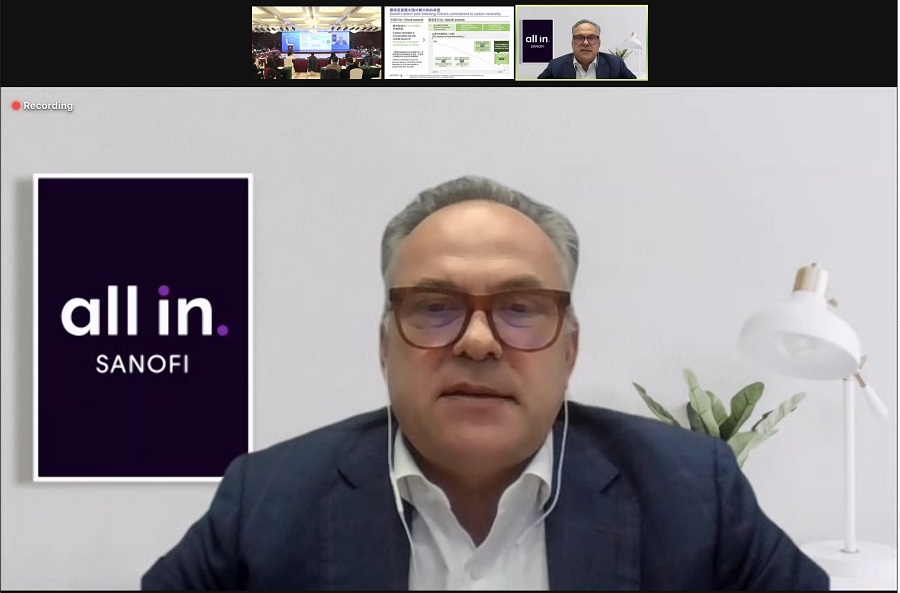
On December 22, 2021, on the first anniversary of the establishment of the Peking University Institute for Global Health and Development (PKU-iGHD), the “2021 Peking University Global Health and Development Forum: Human Health and Medical Innovation in the Era of Low Carbon Economy”was successfully held. Pius S. Hornstein, Country Lead, Sanofi Greater China, delivered a keynote speech at the Session of Medical Innovation for Sustainable Development.
Climate change represents one of the greatest challenges of our times and has enormous impact on our lives and health. The World Trade Health Organization estimated that between 2030 and 2050, the climate change could cause 250,000 deaths each year1. To minimize the consequences of global warming, the United Nations calls for carbon neutrality as the solution to counterbalance the build-up of greenhouse gas emissions in our atmosphere2. And we recognize that China has made some major commitments to carbon neutrality as a key pillar of our ecological civilization construction, aiming to keep carbon dioxide emissions before 2030 and achieve carbon neutrality before 2060; Chairman Xi specifically called for emissions per unit of GDP to be reduced by 65% by 20303. This is an important ambition. Deeply rooted in China for 40 years, Sanofi as a local multinational is strongly committed to the health and wellbeing of the Chinese people. We are taking the initiative of minimizing the impact of our activities on the environment while developing and delivering life-saving medicines and vaccines, and introducing many new innovations into China.
In 2015, we said we were set to make a commitment after the COP 21 and the Paris Agreement to reach carbon neutrality by 2050. Now, recognizing the immense challenge we face, we have completely revised our goals, and just announced that we plan to achieve carbon neutrality by 2030, 20 years ahead of our initial plan. We are pushing the limits to achieve net zero defined by clear standards by 2050 as part of ourcommitment to protecting and improving lives worldwide and in China.
So how are we going to achieve that? We have developed a very comprehensive roadmap, which encompasses our innovative healthcare solutions, our way of doing business, our operations, our whole value chain on how we research, develop and manufacture products, but also very importantly the employee mindset and behaviors.
Firstly, let us look at environmental aspects related to our products. We continue to explore how the product impacts the environment and take special care to ensure that our products are developed, used and disposed in a most responsible manner across the whole value chain. From research, packaging, production, and also plant management, we invest great effort to minimize impact. We are constantly expanding our knowledge of the environment and effects of our product ingredients on the environment. To date, we have done an assessment of 60 compounds worldwide which represents a starting point, and by 2050, we want to have assessed all our best-selling products and big block processes across the world to reduce impact.
Secondly, Sanofi is strongly committed to minimizing the potential environmental impact of our operations, meaning from how we maximize renewable energy, and manage infrastructure and waste. For example, solar power in our manufacturing sites effectively reduces carbon CO2 emissions and helps to achieve our carbon neutrality targets by 2030.
Thirdly, a key part of our activities is to mobilize our employees and their relatives and families to change mindset and behaviors, and make a positive impact on the society. We have accelerated our efforts on cultivating our new green ways of working. We launched the “ Planet Mobilization ” Initiative as a key program at Sanofi to practice our commitment to sustainability, deeply ingrained in our ways of working. We are also implementing dedicated initiatives, such as volunteering paperless campaigns. We are opening new brainstorming channels together with our employees, collecting ideas from the grassroots to best understand which small steps and major initiatives we can envision across the company and across the life we are living. Moving forward as a digitally leading company, we will continue to amplify influence digitally through launching a Green Day app, as well as promoting our digital interaction with healthcare professionals, our live broadcast channel called SanofiTube, connecting with our employees and the ecosystem in China. We are very proud of really trying to mobilize all our 8,000 employees in China to make a difference on the lives of millions of patients.
To conclude, this is not just a Sanofi-driven effort. The R&D-based Pharmaceutical Association Committee (RDPAC) and its member companies, as well as our entire society, all play a key role in achieving sustainable development of pharmaceuticals in China. A joint effort is needed. We really want to make a call to action to deliver our green ambitions in China, together with the government, together with the industry associations: It is time that we come together as a team to construct a clean ecosystem that rewards innovation for sustainability. We believe that regulators actually could help by encouraging and accelerating the approval process for innovative green technology. Payers could leave a critical mark eventually by developing proven systems that truly recognize and reward companies for the efforts they put into the green production design process. Hence not only Sanofi, but all companies can sustainably contribute to a healthier and more ecological life in China. And finally, we believe that policymakers will also work together with us. That can help us set a framework of rules that are fair for companies consistently living their green commitment and contributing to a green economy of China.
Together we can make this happen. Aside from providing great medicines for people, we also would like to minimize the impact on our ecosystem and to be a true partner to the government and the ecosystem for having a greener and healthier environment.